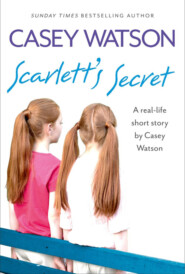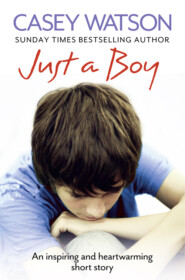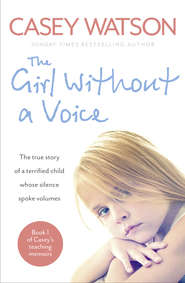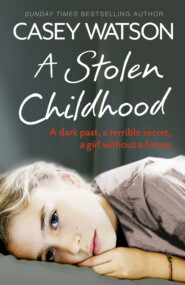По всем вопросам обращайтесь на: info@litportal.ru
(©) 2003-2025.
✖
Nowhere to Go: The heartbreaking true story of a boy desperate to be loved
Настройки чтения
Размер шрифта
Высота строк
Поля
I looked over at Tyler, who, like John, had been watching my reaction, and, again, lowered his head when he caught my eye.
‘Hey, Bart Simpson,’ I said, forcing him to respond and meet my gaze again, ‘how do you fancy coming to stay with me for a while? I’ll have to speak to my husband – he’s called Mike, by the way – but I’m sure he’d love to have another boy around the house. So. How about it?’
Tyler had shrunk so far into his hood by this time that he looked like he was peeping out from behind a shrubbery. ‘Don’t care if I do, don’t care if I don’t,’ he said, seeming suddenly far less cocky than he had been up to now. My heart went out to him. He was 11 and he was sitting in an interview room in a police station, he was being discussed by strangers and, most of all, he wasn’t going home. Didn’t matter how much of a witch he had his stepmother pegged as, he wasn’t going home. And now the adrenalin had gone, it looked like that fact was beginning to sink in. No wonder he looked like he’d had the stuffing knocked out of him.
I smiled at him again, and smiled at John. ‘I’ll take that as a yes, then,’ I said. ‘Give me a call later then, John, yes? I’m sure we can sort something out.’
‘Thanks, Casey,’ John said, running his hand through his hair. He patted my arm then – a familiar unspoken gesture. I knew it meant he’d been all out of options and was grateful.
‘Right, then,’ I said, rising from my chair. ‘I’ll be off, then. See you soon, Tyler, yeah?’ I added, moving towards the door again. There was no response but as I turned before going through the doorway the movement of his hood told me he was watching me go.
And what was he thinking? I wondered. About his ‘witch’ of a stepmother? And about me? Something about frying pans and fires? I would certainly figure. I did have long black hair, after all.
‘Erm, so what happened to the “Oh, it’s great having all this time to spend with the grandkids” malarkey?’ Mike wanted to know four short hours later, after I’d recounted the details of my strange day.
Strange, but also curiously uplifting, all things considered. Because by now, it had to be said, I was buzzing. Dad had come round and was doing great, apparently, Mum had stopped worrying and was looking after him (well, getting under the nurses’ feet, more likely, bless her) and the prospect of taking on the lad I’d met earlier had gone from being a possibility to a probability to a cast iron certainty – well, in my head, at least. I still had to convince Mike.
Who was still on the same track. ‘And what happened to the “Let’s take a few months out from fostering” for that matter? You have a very short memory, my dear …’
It was true. I had said all of that. And when I’d said it, I’d truly meant it. But the very fact that Mike was teasing me about it was a Very Good Sign Indeed. If he’d been set against it, he wouldn’t be teasing. He’d be frowning. As it was I knew I wouldn’t have to work too hard to convince him.
‘Oh, shut up!’ I said, throwing a cushion in his general direction for good measure. ‘And, anyway, it’s been almost a year now. If we leave it much longer we’ll probably have to do retraining. And we don’t want to have to go through the faff of all that, do we?’
I didn’t actually know if we would have to retrain – but it seemed a fair bet we would in some way, shape or form. At the very least in some aspect of health and safety. You couldn’t turn around for new health and safety initiatives, after all, could you? So it was less ‘little white lie’ and more ‘overemphasising the negative’ because I knew it was something that would get him. And I’d been right – a look of horror began spreading across his face. Big and assertive and managerial as he was, my husband was cringingly shy when it came to things involving group participation. And that was something the fostering training process had had in spade loads: lots of role play with fellow trainees and lots of speaking in public. It would be his worst nightmare to have to do it all again.
He dried his hands – he’d been just finishing off the last of the drying up – and now came to join me on the sofa.
‘Okay, so what’s this kid like, then?’ he asked. ‘The real, unvarnished truth, mind. And when were you thinking of him moving in?’
I took a moment to try and think how best to convey my first impressions, and though I could think of lots of ways to couch ‘stabbed his stepmum’ in such a manner that it would sugar the pill slightly, I realised it was probably best to prepare for the worst and then work upwards. ‘I’m not going to lie to you, love,’ I said. ‘He looks like he might be a proper little handful, to be honest. He swears like a trooper and had a bit of a temper on him, too. One that …’ To say or not to say? Yes, say, Casey. ‘Well, remember when Justin first came to us?’
Mike nodded. Slowly. ‘Oh dear.’
‘Well, yes, you say that,’ I countered, turning to face him on the sofa and swinging my legs up beneath me. ‘I mean, he turned out to be such a lovely kid, didn’t he? And look at him now! Imagine if we hadn’t given him that chance? And, well, was it so difficult, really, looking back?’
Mike gave me what my mum would call an old-fashioned look, and perhaps not without very good reason. Justin had been our first ever foster child and his horrendous background (and, boy, it had been a grim one) had caused him to not only build a wall right around him but also the mental equivalent of a roll of barbed wire – he had a tendency to lash out at anyone who tried to help him. His behaviour had been so bad that one previous carer had been moved to point out that he was ‘a newspaper headline just waiting to happen’ – and not one about the Queen’s Jubilee.
For almost a year Justin had turned our lives upside down – and not just Mike and my lives either; the whole family had been involved, particularly our youngest, Kieron, then still in his teens. But it had worked out okay. We eventually got to the root of everything. And Justin had turned out to be like any other kid; hurting and sad and abandoned and alone, and, once he had some love and stability, he responded positively. He blossomed before our eyes, and he grew.
And Justin, fully grown now, was still in our lives, testament to the fact that love and stability had a lot to be said for it. Love and stability, in most cases, worked.
And we could offer that to this lad, though I sensed I didn’t need to bang on about it.
‘You’re right, I suppose,’ Mike agreed – though he might still have had half a mind on ‘Pretend you’re the foster dad and that Mrs Potter is this young girl who is coming on to you …’ Either way, I could tell we were on. ‘And if it turns out to get a bit lively, well, I suppose it keeps us on our toes, doesn’t it?’ he added. ‘Keeps us young.’
I laughed at that, though I’d be lying if I said I wasn’t nervous. ‘Young’ was one thing we weren’t. I was 47 now and Mike was a year older. And though that didn’t make us old, it did make me rational. There were lots of ways of defining the word ‘lively’, after all. And given the sort of kids we had tended to foster so far, I reckoned our definition probably wasn’t the same as most …
Chapter 3 (#u6bc4ec3b-87d5-5412-8c53-613b769037e9)
Because the respite carers were off on holiday within a couple of days of Tyler joining them, we didn’t have much time to get organised. Which was nothing new – we were used to taking in children at short notice – but, given the length of time since our last stint of fostering, ‘getting organised’ this time wasn’t just a case of making a bed up; it involved making a bed visible in the first place. It didn’t matter how many times I pointed out the meaning of the term ‘spare’ room, we were all guilty (even our grown-up kids who No Longer Lived With Us) of using the ones we had – three of them now, all told – as a free branch of Safestore.
But I was happy enough to roll my sleeves up and get stuck in, not only because it gave me something physical to do – always a great stress-buster – but also because I felt the familiar buzz of excitement that always accompanied saying yes to a new child. It was the thrill of the challenge; the anticipation of finding out what made them tick.
That this one needed a temporary loving home was obviously a given, but apart from that we knew very little else, due to Tyler’s social worker being away on maternity leave. Not that John hadn’t tried. He’d at least managed to establish a couple of facts.
‘Or, rather, problems,’ he’d corrected, when he’d popped round the day before and I’d asked him what facts he did know – over and above the parents’ names, anyway, which were apparently Gareth and Alicia. ‘He’s been with them since he was three and there’ve apparently been problems pretty much since the start.’
‘And before that?’
‘Before that he was with his birth mother, now deceased. Died of a drug overdose. He’s been with dad and stepmum ever since.’
I frowned, taking this in. So sad. So familiar. ‘Overdose,’ I parroted.
‘Yes,’ John confirmed. ‘Though whether accidental or intentional, I don’t as yet know. Though I will, of course, just as soon as –’
‘Don’t tell me. The paperwork comes through?’
He grinned wryly. ‘You know the drill, Casey. But it shouldn’t be too long. His new social worker’s been assigned so it’s just a case of him familiarising himself with the notes. We know there’s an element of urgency here, too, what with the charges …’
But I was now with that three-year-old whose mum had taken an overdose. ‘Oh, the poor kid. Though I guess, being three when it happened, one blessing is that he won’t much remember his mum …’
‘I imagine not,’ John agreed. ‘But I don’t think that’s the main issue. From what I’ve gleaned, it’s the relationship with the stepmum that’s key here. And it sounds like it’s not without precedent. She had her own baby, didn’t she? And it’s a pound to a penny that she wasn’t too happy to have another woman’s toddler dumped on her, don’t you think?’
‘Certainly sounds that way,’ I said, feeling saddened by the inevitability of it all. It didn’t have to be that way but, in this case, it apparently was – the unwanted toddler having turned into an unloved pre-pubescent boy, who had responded in kind. And with a knife.
‘Anyway, Thursday at 2 p.m. – is that going to work for you?’ asked John. ‘Oh, and do you think you can work some magic? You know, with school? Almost forgot to tell you – he’s been excluded from his.’
I rolled my eyes. ‘Now you tell me!’
He raised his palms in supplication. ‘Sorry, Casey – I only found that out myself this morning. A case of too many incidents of fighting, and too many last chances, I’m afraid.’
As it was, I knew I probably wouldn’t have too much trouble persuading the head of the local comprehensive to have Tyler, not least because before going into fostering I’d worked there myself for several years. I’d been a behaviour manager, running a unit for the most challenging and challenged kids – the bullied and the bullies, the dispossessed and the disruptive; it was the job that ultimately led to me and Mike making the decision that becoming specialist foster carers was the thing we wanted to do.
As I’d thought, it had only taken a phone call. Of course, that wasn’t to say Mr Moore wouldn’t regret his largesse once Tyler went there – but taking on a child that had been excluded from another school didn’t tend to be something you agreed to if you didn’t at least have an inkling of what you might be taking on. But that had been yesterday and school wasn’t an issue till next week. Right now, I had just over a day and a half to prepare our home – not to mention our lives – for the new member of the family which, in my case, because I’m pathologically obsessed with cleaning, meant a spring clean (my second) and a bit of a clear-out.
Which, as Mike was at work, and Riley was much too busy with her own little addition, meant enlisting my son Kieron to give me a hand.
Kieron was working too – he had recently completed an NVQ and was now a part-time teaching assistant at the local primary school, as well as coaching a youth football team in his spare time – but, as his hours were flexible, I knew he wouldn’t mind coming round to give me a hand, not least because ‘organisation’ was his middle name.
Kieron has what used to be called Asperger’s. These days they’d tend to say he has a mild ASD, or autism spectrum disorder, but back then (he was diagnosed while still in primary school) it was known as Asperger’s syndrome, and manifested itself as an array of behaviours, such as having some difficulty relating to peers, disliking change (it did and still does make him anxious) and liking all his belongings to be just so – or woe betide whoever messed them up. He was also a bit of a fact-fiend: the archetypal child who could always tell you which actor was in which movie and who kept his CDs ad DVDs in perfect alphabetical order.
And just as Kieron’s Asperger’s taught me and Mike so much that we were able to use once we started fostering, so I was able to teach Kieron all sorts of things about cleaning houses, not to mention recruit him to help me willingly at times such as these.
We were now surveying the bedrooms we’d just cleared out between us, deciding which would be the best for Tyler to go in. I had three spare rooms since no one was currently living with us: the pink and blue ones, which I’d had the foresight to decorate thus, to cover both fostering bases, plus one that we’d decorated neutrally with a plan to keep it for visiting relatives. Though, as it had worked out, it had been pressed into service for a foster child or two as well; most notably when we looked after a more profoundly autistic boy, Georgie, who couldn’t cope with being in either a pink or a blue room. As with everything to do with fostering, we lived and learned.
But the furniture in there was old and fusty – including the family heirloom wardrobe. Had I been 11 it wasn’t the room I’d have chosen, to be sure. ‘So the blue room makes sense,’ I said to Kieron, ‘because that’s half the job done already. But how do I dress it up? What do 11-year-old boys currently like?’
It wasn’t as much of a no-brainer question as it might have seemed. Fashions changed so quickly where kids were concerned, and though I could give you chapter and verse on my little grandsons I had no idea what was currently ‘in’ with older boys.











